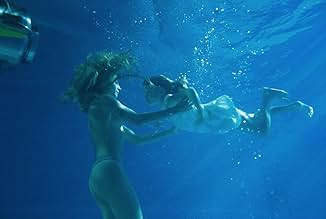Various lives converge on an isolated island, all connected by an author whose novel has become inextricably entwined with his own life.Various lives converge on an isolated island, all connected by an author whose novel has become inextricably entwined with his own life.Various lives converge on an isolated island, all connected by an author whose novel has become inextricably entwined with his own life.
- Awards
- 11 wins & 18 nominations
María Álvarez
- Enfermera
- (as María Alvarez)
Javier Coromina
- Camarero Chiringuito
- (as Javier Corominas)
Alesandra Álvarez
- Luna 1 año
- (as Alesandra Alvarez)
José Ferreira
- Emplastro
- (uncredited)
- Director
- Writer
- All cast & crew
- Production, box office & more at IMDbPro
Storyline
Did you know
- TriviaSome of the most sexual explicit content was made by doubles, not by the main actors.
- GoofsA full moon between two buildings is shown during midday when Lorenzo meets his daughter Luna for the first time - which is astronomically impossible.
- Crazy creditsCredits scroll in the opposite direction.
- Alternate versionsThe US cut removes most of the frontal nudity and runs approximately 2 minutes shorter.
- ConnectionsFeatured in Brows Held High: Room in Rome (2013)
- SoundtracksUn Rayo de Sol
Written by Daniel Vangarde (as Vangarde), Claude Carrère and Amado Jaén (as Jaen)
(c) Bleu Blanc Rouge Editions Soc - Editions Productions Zagora
Ediciones Musicales Clipper's, S.L.
Featured review
Stories told in a so-called "magical realism" style like this film can be very tricky. The story and the characters need to be very strong to sustain all the twists of the plot and I don't think this was pulled off here. I was disappointed, as I'd enjoyed Medem's previous film Los Amantes del Circulo Polar, where the passionate love story seemed a lot more genuine and the tragic ending seemed to fit better with the theme of fate playing with people's lives than Lucia y el sexo's tragic-to-happy contortions.
Also, while the female characters were all charming and sexy, the male roles were really poor and unconvincing. What on earth did Lucia see in Lorenzo? There isn't enough to justify her endurance and patience with him. Their whole love story seems artificial from the inception, it seems there was too much work on the symbolism of their relationship - the tormented writer and storyteller, the reader and savior (Lucia as a ray of sunshine) - rather than on the real intensity of feeling between two people. The sex scenes are too stylish and sleek to be really passionate. Everyone is good looking and well dressed, they live in nice apartments, exist in a bubble where the society around them doesn't seem to affect them, this is obviously purposefully so and ideally you wouldn't mind that lack of realism if the story was engrossing enough, which it isn't.
The entire plot seems to revolve around the concept of the ability to deal with tragic fateful events by rewriting, literally and metaphorically, one's own life story. But the final optimism comes across as too artificial. The plot does not resolve the fate of the child Luna, Lorenzo's daughter. The tragedies seem more like a prop, a trick to demonstrate how love can conquer guilt, remorse and failure. They're not given enough weight. People slash their wrists or throw themselves under buses easier than they cry, then we're supposed to believe they can just forget and forgive and live happily ever after.
The director says he wanted to make everything "light" in this film, after the experience with the previous one. But I think he overdid it! There is a bit too much of the French 'Amelie' in Lucia's character, she is more like a beautiful fairy than a real person. Elena, too, is more a symbol of caring and nurturing (motherhood, cooking, taking care of Lucia) than a real grieving mother. Her lack of anger and bitterness is not very believable. The whole escapist symbol of the floating island becomes annoying after a while. It functions on the characters like a drug inducing apathy and oblivion, more of a way of avoiding pain than confronting it. But it's not that, it's the way in which it's presented and wrapped up at the end that really disappoints - too fancy and too abstract to really work.
It's not a bad film. It's full of eye candy - the spectacularly gorgeous Paz Vegas, the island, the photography - and it is well directed and well acted overall. But without all that, the story itself wouldn't really be worth much.
Also, while the female characters were all charming and sexy, the male roles were really poor and unconvincing. What on earth did Lucia see in Lorenzo? There isn't enough to justify her endurance and patience with him. Their whole love story seems artificial from the inception, it seems there was too much work on the symbolism of their relationship - the tormented writer and storyteller, the reader and savior (Lucia as a ray of sunshine) - rather than on the real intensity of feeling between two people. The sex scenes are too stylish and sleek to be really passionate. Everyone is good looking and well dressed, they live in nice apartments, exist in a bubble where the society around them doesn't seem to affect them, this is obviously purposefully so and ideally you wouldn't mind that lack of realism if the story was engrossing enough, which it isn't.
The entire plot seems to revolve around the concept of the ability to deal with tragic fateful events by rewriting, literally and metaphorically, one's own life story. But the final optimism comes across as too artificial. The plot does not resolve the fate of the child Luna, Lorenzo's daughter. The tragedies seem more like a prop, a trick to demonstrate how love can conquer guilt, remorse and failure. They're not given enough weight. People slash their wrists or throw themselves under buses easier than they cry, then we're supposed to believe they can just forget and forgive and live happily ever after.
The director says he wanted to make everything "light" in this film, after the experience with the previous one. But I think he overdid it! There is a bit too much of the French 'Amelie' in Lucia's character, she is more like a beautiful fairy than a real person. Elena, too, is more a symbol of caring and nurturing (motherhood, cooking, taking care of Lucia) than a real grieving mother. Her lack of anger and bitterness is not very believable. The whole escapist symbol of the floating island becomes annoying after a while. It functions on the characters like a drug inducing apathy and oblivion, more of a way of avoiding pain than confronting it. But it's not that, it's the way in which it's presented and wrapped up at the end that really disappoints - too fancy and too abstract to really work.
It's not a bad film. It's full of eye candy - the spectacularly gorgeous Paz Vegas, the island, the photography - and it is well directed and well acted overall. But without all that, the story itself wouldn't really be worth much.
- bitterstranger
- Nov 18, 2004
- Permalink
Details
Box office
- Gross US & Canada
- $1,594,779
- Opening weekend US & Canada
- $47,591
- Jul 14, 2002
- Gross worldwide
- $7,640,680
- Runtime2 hours 8 minutes
- Color
- Sound mix
- Aspect ratio
- 2.35 : 1
Contribute to this page
Suggest an edit or add missing content




























